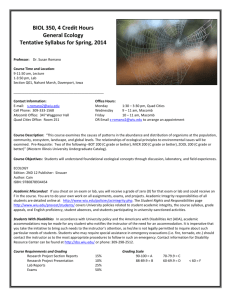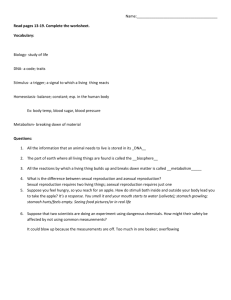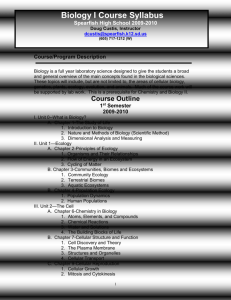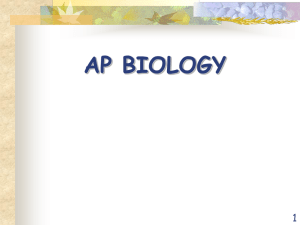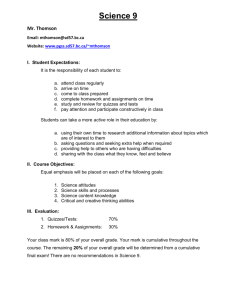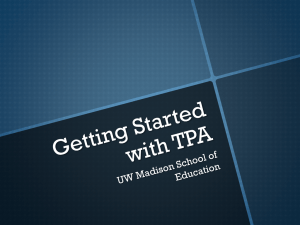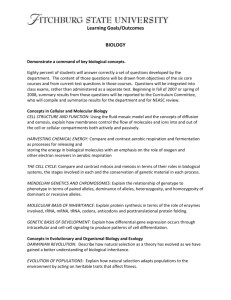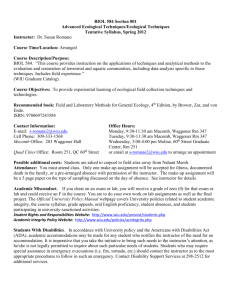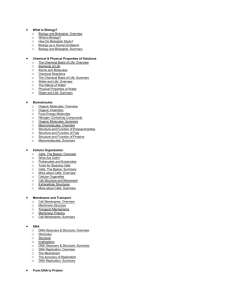biol 100y hum
advertisement
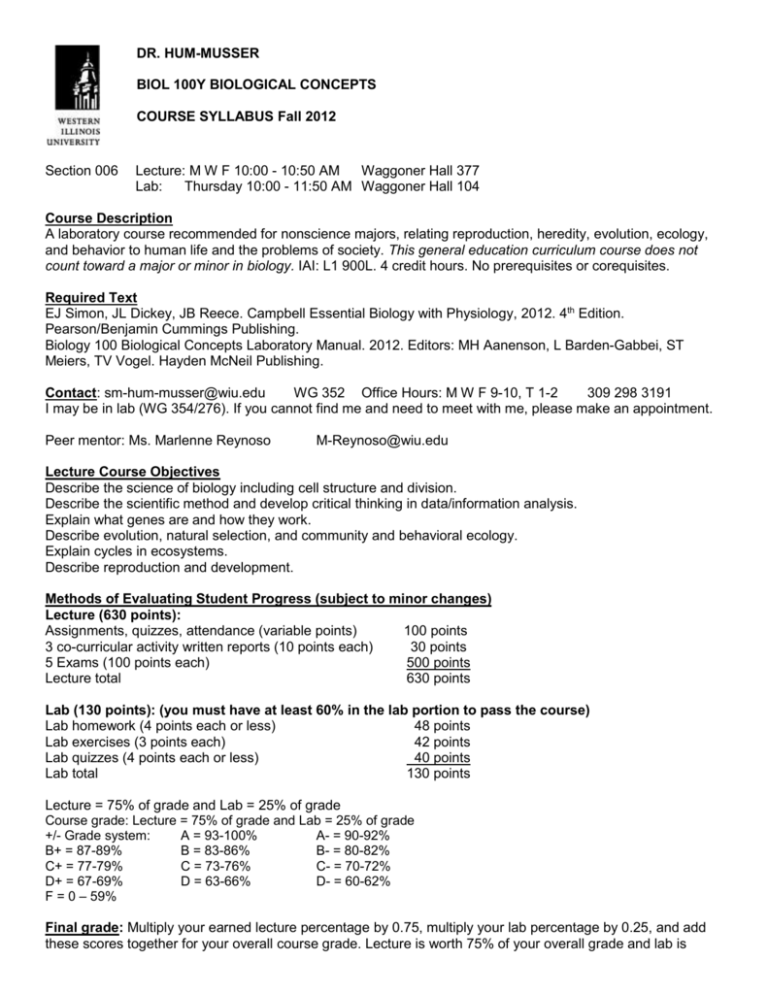
DR. HUM-MUSSER BIOL 100Y BIOLOGICAL CONCEPTS COURSE SYLLABUS Fall 2012 Section 006 Lecture: M W F 10:00 - 10:50 AM Waggoner Hall 377 Lab: Thursday 10:00 - 11:50 AM Waggoner Hall 104 Course Description A laboratory course recommended for nonscience majors, relating reproduction, heredity, evolution, ecology, and behavior to human life and the problems of society. This general education curriculum course does not count toward a major or minor in biology. IAI: L1 900L. 4 credit hours. No prerequisites or corequisites. Required Text EJ Simon, JL Dickey, JB Reece. Campbell Essential Biology with Physiology, 2012. 4th Edition. Pearson/Benjamin Cummings Publishing. Biology 100 Biological Concepts Laboratory Manual. 2012. Editors: MH Aanenson, L Barden-Gabbei, ST Meiers, TV Vogel. Hayden McNeil Publishing. Contact: sm-hum-musser@wiu.edu WG 352 Office Hours: M W F 9-10, T 1-2 309 298 3191 I may be in lab (WG 354/276). If you cannot find me and need to meet with me, please make an appointment. Peer mentor: Ms. Marlenne Reynoso M-Reynoso@wiu.edu Lecture Course Objectives Describe the science of biology including cell structure and division. Describe the scientific method and develop critical thinking in data/information analysis. Explain what genes are and how they work. Describe evolution, natural selection, and community and behavioral ecology. Explain cycles in ecosystems. Describe reproduction and development. Methods of Evaluating Student Progress (subject to minor changes) Lecture (630 points): Assignments, quizzes, attendance (variable points) 100 points 3 co-curricular activity written reports (10 points each) 30 points 5 Exams (100 points each) 500 points Lecture total 630 points Lab (130 points): (you must have at least 60% in the lab portion to pass the course) Lab homework (4 points each or less) 48 points Lab exercises (3 points each) 42 points Lab quizzes (4 points each or less) 40 points Lab total 130 points Lecture = 75% of grade and Lab = 25% of grade Course grade: Lecture = 75% of grade and Lab = 25% of grade +/- Grade system: A = 93-100% A- = 90-92% B+ = 87-89% B = 83-86% B- = 80-82% C+ = 77-79% C = 73-76% C- = 70-72% D+ = 67-69% D = 63-66% D- = 60-62% F = 0 – 59% Final grade: Multiply your earned lecture percentage by 0.75, multiply your lab percentage by 0.25, and add these scores together for your overall course grade. Lecture is worth 75% of your overall grade and lab is worth 25%. You must pass the both the lab and lecture to pass the course. Departmental policy states that attendance and proper completion of the exercises count towards your lab grade. If you have more than one UNEXCUSED lab session (without solid documentation for illness, etc.), or more than three TOTAL lab absences, this will result in a final grade of “F” for the entire course, regardless of your points in lecture. See the lab syllabus for more details on excused and unexcused absences. Course Requirements 1. Attendance and punctuality is required. If absent, obtain additional notes from another student/textbook. 2. All cell phones and laptops must be turned off/silenced & out of sight. If using a laptop computer for note taking, only note-taking or lecture slides may be accessed. Do not browse the internet. 3. Reading of the textbook, lecture notes, & supplementary material is required. Course information, notes are on your Desire2Learn/WesternOnline account, through the homepage. When available, bring a copy of notes to class. Take notes during lecture and lab, follow along with the slides & textbook. Contact UTech www.wiu.edu/university_technology for computing issues. Go to http://www.wiu.edu/guava to activate/update your account. 4. Exams will be multiple choice (require 2HB pencils), fill-in-the-blanks, short- & long-answer questions, drawing & labeling, and/or short essay. Exams are cumulative covering both lecture and lab material but will focus on material covered since the previous exam. Knowledge of prior terms/concepts will be expected & will not be redefined. 5. Unannounced quizzes will be given. There are no makeup exam/quiz/assignments 6. Keep backup copies of your assignments. 7. All course rules & policies, exam dates, & grading scale apply to all students equally. 8. Course information in available through Desire2Learn WesternOnline, or through the students’ WIU e-mail accounts. 9. Academic honesty is required. Cheating or plagiarism will result in 0 points for that exam/quiz/assignment. Students will conduct themselves with personal integrity & honesty. You should be familiar with & abide by the regulations in the WIU Policy manual, this syllabus and the Code of Student Conduct & the Student Rights & Responsibilities, & Student Academic Integrity Policy (http://www.wiu.edu/provost/policies/). You are expected to do your own work, be honest, do not be disruptive, be respectful of others, & actively participate. Breach of policy will be dealt with severely following the direction of the University & the instructor’s discretion. 10. The time to be concerned about your grade is the first 14 weeks of class, not the last 2 weeks. Learning is a group activity. The behavior of each person in class affects the learning outcomes of others. Definition of Plagiarism: “Plagiarism is the theft of someone else’s words, work, or ideas. It includes such acts as (1) turning in a friend’s paper & saying it is yours; (2) using another person’s data or ideas without acknowledgement; (3) copying an author’s exact words & putting them in your paper without quotation marks; & (4) using wording that is very similar to that of the original source but passing it off as entirely your own even while acknowledging the source.” V. E. McMillan in Writing Papers in the Biological Sciences (Bedford/St.Martin’s Press,New York, pg 16). This includes information in written or audio information from online websites, textbooks or laboratory manuals, honors & masters theses, all writing assignments, & images. Academic Accommodations - “In accordance with University policy and the Americans with Disabilities Act (ADA), academic accommodations may be made for any student who notifies the instructor of the need for an accommodation. For the instructor to provide the proper accommodation(s) you must obtain documentation of the need for an accommodation through Disability Resource Center (DRC) and provide it to the instructor. It is imperative that you take the initiative to bring such needs to the instructor's attention, as he/she is not legally permitted to inquire about such particular needs of students. Students who may require special assistance in emergency evacuations (i.e. fire, tornado, etc.) should contact the instructor as to the most appropriate procedures to follow in such an emergency. Contact Disability Resource Center (DRC) at 298-2512 for additional services.” -2- The syllabus and schedule below is subject to change, including additional assignments, quizzes, etc. The co-curricular activities require Dr. Hum-Musser’s prior approval and may require proof of attendance. 8/20 8/22 8/24 Chapter 1 - Course Introduction, Biology Today Chapter 1 - Biology Today Chapter 2 - Essential Chemistry for Biology No labs this week 8/27 8/29 8/31 Chapter 2 - Essential Chemistry for Biology Chapter 3 – Molecules of Life Chapter 3 – Molecules of Life Lab week 1 – Intro, Metric/Microscopes 9/3 9/5 9/7 Labor Day Holiday Chapter 26 - Reproduction and Development Chapter 26 - Reproduction and Development Lab week 2 – STDs 9/10 9/12 9/14 Chapter 4 – Tour of the Cell Chapter 4 – Tour of the Cell Exam 1 – Chapters 1, 2, 26, 3 Lab week 3 – Reproduction & Development 9/17 9/19 9/21 Chapter 5 - Transport across the Membrane Lab week 4 – Cell Structure & Function Chapter 8 - Cell Reproduction Chapter 8 - Cell Reproduction: Mitosis, Cancer (#1 Co-curricular activity report due) 9/24 9/26 9/28 Chapter 8 - Cell Reproduction: Meiosis Chapter 8 - Cell Reproduction: Meiosis Chapter 9 - Patterns of Inheritance Lab week 5 – Cell Division 10/1 10/3 10/5 Chapter 9 - Patterns of Inheritance Chapter 10 - DNA Structure Exam 2 – Chapters 4, 5, 6, 7, 8, 9 Lab week 6 – Genetics-Monohybrid Cross 10/8 Chapter 10 - DNA Replication 10/10 Chapter 10 - DNA Function: Transcription 10/12 Fall Break – No classes Lab week 7 – Genetics Problems 10/15 Chapter 10 - DNA Function: Transcription 10/17 Chapter 11 - How Genes are Controlled 10/19 Chapter 11 - How Genes are Controlled Lab week 8 – Human Heredity 10/22 Chapter 12 – DNA Technology 10/24 Chapter 12 – DNA Technology 10/26 Exam 3 – Chapters 10, 11, 12 Lab week 9 – Ecology-Population Growth I 10/29 Chapter 13 – How Populations Evolve (#2 Co-curricular activity report due) 10/31 Chapter 13 – How Populations Evolve Lab week 10 – Molecular Genetics 11/2 Chapter 14 – How Biological Diversity Evolves 11/5 11/7 11/9 Chapter 15 – Origin of Life Chapter 17 – Human Evolution Chapter 18 – Ecology and the Biosphere Lab week 11 – Ecology-Population Growth II 11/12 Chapter 18 – Ecology and the Biosphere 11/14 Chapter 19 – Population Ecology 11/16 Exam 4 – Chapters 13, 14, 15, 17 Lab week 12 - Migrations -3- 11/19, 11/21, 11/23– No classes, Thanksgiving break 11/26 Chapter 19 – Population Ecology 11/28 Chapter 20 – Communities and Ecosystems 11/30 Chapter 20 – Communities and Ecosystems 12/3 12/5 12/7 Lab week 13 – Ecology-Population Growth III Animal Behavior (#3 Co-curricular activity report due) Animal Behavior Review for final exam Lab week 14 – Animal Behavior 12/10 Monday – Final exam at 10:00-11:50 PM (1 hour 50 minutes) – Chapters 18, 19, 20, Animal Behavior -4-
